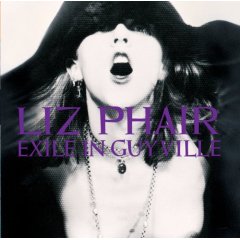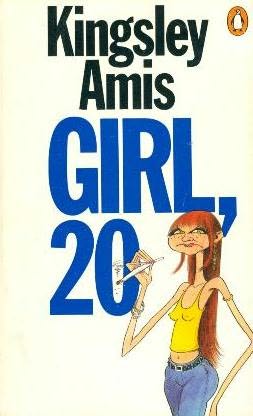 Carrie’s posting about the fifteenth-anniversary reissue of Exile in Guyville reminds me that it was Our Girl who introduced me to the music of Liz Phair twelve years ago. I had come to Chicago to pay her a visit, and she played me a mixtape (remember those?) as we drove to dinner. Our Girl has long considered it her duty to keep me conversant with the newest wrinkles in popular culture, so none of the artists on the tape was familiar to me. The music washed undistractingly over us as we discussed the day’s adventures. Then a woman with a low, throaty voice sang a song whose first lines caught my ear:
Carrie’s posting about the fifteenth-anniversary reissue of Exile in Guyville reminds me that it was Our Girl who introduced me to the music of Liz Phair twelve years ago. I had come to Chicago to pay her a visit, and she played me a mixtape (remember those?) as we drove to dinner. Our Girl has long considered it her duty to keep me conversant with the newest wrinkles in popular culture, so none of the artists on the tape was familiar to me. The music washed undistractingly over us as we discussed the day’s adventures. Then a woman with a low, throaty voice sang a song whose first lines caught my ear:
I woke up alarmed
I didn’t know where I was at first
Just that I woke up in your arms
And almost immediately I felt sorry
“Who’s that?” I asked. The song, OGIC replied, was from an album by a Chicago singer-songwriter that was intended as an “answer” to the Rolling Stones’ Exile on Main Street. “I want to hear the whole thing,” I replied, and later that night I listened to Exile in Guyville for the first time. It opened with another line that made me sit up and take notice: I bet you fall in bed too easily/With the beautiful girls who are shyly brave. The rest of the album hit me just as hard. Not only did I feel that I’d been given a glimpse into the private lives of my younger friends, but I was excited by the spare, raw-sounding instrumental tracks laid down by Phair’s band.
 I bought Guyville and Go West, Phair’s second album, as soon as I got back to New York, and told everyone I met about my latest discovery. Most of them were way ahead of me. “You can stop trying to be hip now,” a twentysomething friend said to me with dry, tolerant amusement a few weeks later. “It isn’t working.” I winced at her remark, which reminded me of a scene in Kingsley Amis’ Girl, 20 in which Sir Roy Vandervane, a Leonard Bernstein-like conductor of a certain age who takes up with a seventeen-year-old girl and writes a concerto for violin and rock band, is accused of trying to “arse-creep youth.”
I bought Guyville and Go West, Phair’s second album, as soon as I got back to New York, and told everyone I met about my latest discovery. Most of them were way ahead of me. “You can stop trying to be hip now,” a twentysomething friend said to me with dry, tolerant amusement a few weeks later. “It isn’t working.” I winced at her remark, which reminded me of a scene in Kingsley Amis’ Girl, 20 in which Sir Roy Vandervane, a Leonard Bernstein-like conductor of a certain age who takes up with a seventeen-year-old girl and writes a concerto for violin and rock band, is accused of trying to “arse-creep youth.”
Since then I’ve weathered a midlife crisis, survived a bout of congestive heart failure, and managed to cross the fiftieth meridian without buying a red sports car or marrying a woman half my age. (Mrs. T and I are coeval.) Not surprisingly, I now put less energy into staying abreast of current cultural events. As I wrote in this space two years ago:
I suspect I’ve entered a fallow period, a necessary time of recovery after the frenzied events of the second half of 2005. I nearly died, then I turned fifty: that’s enough to knock anybody off his pins, and I’d say I was well and truly knocked. The other day I had occasion to quote to a friend the Spanish proverb that figures frequently in Patrick O’Brian’s Aubrey-Maturin novels, May no new thing arise. That’s for me. More than a few new things arose in my life in the past couple of years, and for the moment I’ve had enough.
This, too, shall pass, sooner or later. At some point I’m sure I’ll start to feel the tug of the new, bob to the surface, and start sniffing the air. I always have. But not just yet. I’m not quite ready to engage with the moment. I think I’ll stick to the tried and true for a little while longer. The world will have to take care of itself, for now.
I’m sniffing the air again, but not so obsessively as I used to: I’ve pretty much given up on new movies, for instance, and I don’t even pretend to know what’s going on in pop music. One can only absorb so many new things in a lifetime. These days I devote most of my absorptive capacity to the shows I write about each Friday in The Wall Street Journal. I’m embarrassed to say that I didn’t even bother to check out Liz Phair’s last album.
Last month Mark Sarvas posted a list of “beloved books he’s afraid to re-read for fear they won’t hold up.” I was tempted to follow suit, but after reading Carrie’s posting, I’m more inclined to opt for music over literature. Perhaps Exile in Guyville belongs on that list. It’s been a couple of years since I last put it on, and I wonder what I’d think of it now. Would it excite me as much as it did when I first heard it in Our Girl’s living room? I’m not entirely sure I want to know. Certain pleasures are better remembered than revisited.
I should add, however, that a fifty-two-year-old man probably has no business feeling nostalgic about something that happened when he was forty. Nostalgia is a seductive and dangerous drug, to be used in the strictest of moderation on pain of losing your grip on the present moment. I don’t often have occasion to quote Frank Zappa, but he once said something very much to the point: “It isn’t necessary to imagine the world ending in fire or ice–there are two other possibilities: one is paperwork, and the other is nostalgia.”
